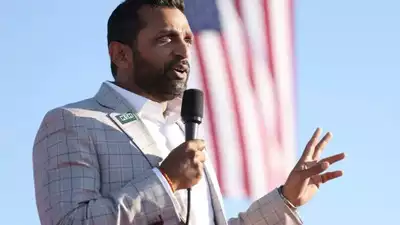Anti-Trump burnout: The resistance says it’s exhausted

WASHINGTON: In 2017 they donned pink hats to march on Washington, registering their fury with Donald Trump by the hundreds of thousands.
Then they flipped the House from Republican control, won the presidency and secured a surprisingly strong showing in the 2022 midterm elections, galvanized by their conviction that Trump and his allies constituted a national emergency.
This year, anti-Trump voters are grappling with another powerful sentiment: exhaustion.
“Some folks are burned out on outrage,” said Rebecca Lee Funk, the Washington-based founder of the Outrage, a progressive activism group and a purveyor of resistance-era apparel. “People are tired. I think last election we were desperate to get Trump out of office, and folks were willing to rally around that singular call to action. And this election feels different.”
But for Democrats, the mission is similar: Now defending the White House, President Joe Biden is trying to reassemble that sprawling anti-Trump coalition, casting the 2024 contest as another battle to save American democracy as Trump moves toward the Republican nomination.
Biden, however, has a lot of work to do. Interviews with nearly two dozen Democratic voters, activists and officials make clear his challenge in energizing Americans who are unenthusiastic about a likely 2020 rematch, are worried about his age and, in some cases, are struggling to sustain the searing anger toward Trump that Democrats have relied on for nearly a decade.
“We’re kind of, like, crises-ed out,” said Shannon Caseber, 36, a security guard in Pittsburgh who called the prospect of a Trump-Biden rematch a “dumpster fire.” She added, “It’s crisis fatigue, for sure.”
Caseber, a Democrat who would back Biden over Trump, added, “Any sense of urgency that we had with the 2020 election — I think it’s still there in the sense that no one wants Trump to be president, at least for Democrats, but it’s exhausting.”
Democrats are hardly alone in their political fatigue: A Pew Research Center survey last year found that 65% of Americans said they always or often felt exhausted when they thought about politics.
“Exhaustion is underlying the entire attitude toward our presidential election,” said Whit Ayres, a veteran Republican pollster. “When you’ve got two people that are opposed by 70% of Americans who want a different choice, it creates frustration, anxiety and discouragement.”
Democratic pollsters and strategists say that no one is more motivating or terrifying to their voters than Trump.
Buoyed by strong showings in special elections last week, and other recent contests including a successful write-in campaign for Biden in New Hampshire’s primary, many believe their voters will grow increasingly engaged as the general election nears and Trump’s legal problems unfold.
He confronts 91 felony charges across four cases, is poised to be the first former president to face a criminal trial and now has staggering financial problems. He has also privately expressed support for a 16-week national abortion ban, with some exceptions, The New York Times reported Friday, and Democrats see abortion rights as a powerful motivator for their base and for some swing voters.
But there are pronounced warning signs on the left, as well.
A CNN poll recently asked how motivated Americans were to vote in the election. Republicans, out of power and eager to regain it, were more likely to say “extremely motivated.” A Yahoo News/YouGov poll asked voters in the fall about their attitudes toward the 2024 election. Thirty-nine percent of Democrats picked “exhaustion” from the list of sentiments offered (a close second to “dread”). Just 26% of Republicans chose “exhaustion.”
Broadly, surveys have shown erosion in the party’s standing with traditional Democratic constituencies. On the left, some groups have warned of funding challenges and voter apathy, and the most visible source of in-the-streets energy is progressive frustration with Biden over his support for Israel.
Lauren Hitt, a spokesperson for Biden, said there was tangible evidence of enthusiasm in recent weeks, including on the fundraising front.
She also signaled that the campaign’s messaging would go beyond simply opposing Trump, drawing contrasts with Republicans on abortion rights and gun safety as she described the stakes of the election, and nodding to Biden’s policy accomplishments on issues such as combating climate change and child poverty.
“This election determines whether we build on that progress or we lose so many of our fundamental freedoms,” she said in a statement.
Many Democrats have argued that the party must do more to press an affirmative case for Biden’s reelection, beyond just stopping Trump again. They also worry that some voters could vote third party or sit out altogether this year.
“They hear it every cycle: This is the most important election ever,” said Leah D. Daughtry, a Democratic strategist.
While she considers Trump an “existential threat,” she said, “people want to vote for something and not necessarily against something.”
Max Dower, founder of clothing line Unfortunate Portrait, recently designed a $78 shirt that reflected his sense of feeling “uninspired” about the election. It featured an image of Biden, 81, using a walker to fend off a cane-wielding Trump, 77, with the message, “Vote 2024.” He said it had drawn more engagement on social media than any design he had posted in roughly eight years (it also inevitably set off political battles in his Instagram comments).
After years of feeling that the country was veering from one crisis to the next, Dower, who said he voted for Biden in 2020, suggested that he was burned out.
“We’ve dealt with so many emergencies these past few years: national emergencies, perceived emergencies, real emergencies — it’s just kind of like, that is not really a strong motivator for me anymore,” said Dower, who is based in Los Angeles. He declined to say how he would vote this year but said he was unlikely to cast a ballot for Trump.
“A lot of us would like a more positive thing to motivate us,” he said. “Not just purely, ‘Do this or else this bad thing is going to happen.'”
Certainly, Trump is hardly a morning-in-America candidate. And while some have tuned him out since he left office, he will be unavoidable in an election year — reminding voters, Democrats hope, of everything they have long disliked about him.
The former president, whose supporters attacked the Capitol to try to overturn the 2020 election, has encouraged political violence, spread conspiracy theories and preached a darkly nativist vision. He has sought to undermine American institutions and threatened to upend the international order, recently suggesting that he would encourage Russian aggression against American allies.
“People are going to be more alert because Trump has become even more outrageous in his post-presidency,” Gov. Roy Cooper of North Carolina, a Democrat, said in an interview last month. “It will be a challenge to make sure that people are aware of what he is doing, because I think that sometimes he is so outrageous, so consistently, that there’s a danger that it can be normalized. But I do believe that the stakes will be so high in this election that people will, at the end of the day, understand that our democracy truly is at stake.”
Democrats are also trying to put abortion rights on the ballot, literally and figuratively. The Biden campaign has already started advertising on the issue.
Leah Greenberg, co-executive director of the Indivisible Project, a progressive grassroots group, said her organization was supporting ballot measure efforts that would protect abortion rights in key states. She also argued that full Democratic control of Washington could lead to meaningful abortion protections nationally.
“Burnout tends to be a function of a sense of powerlessness,” she said. “People are activated around getting our rights back.”
That kind of message resonated with Dorothy Stevenson, 64, of Milwaukee. She did not vote for president in 2020, she said, alluding to Biden’s tough-on-crime record as a senator, saying she worried at that time that he was not “really for Black people.” Now, she said, she is unexcited by her choices but intends to support Biden because she believes the stakes of the election are higher.
“It’s really, really, really, really because of the abortion issue — I think that they need to stay away from women’s bodies,” she said. The potential return of Trump, she said, is “a crisis.”
Many Americans have been in denial about the prospect of a Trump-Biden rematch. But as Trump moves closer to being renominated, some Democrats say their voters are beginning to grasp the significance of his return.
Rep. Veronica Escobar, D-Texas, a Biden campaign co-chair, said she “heard some fatigue and some concern” in the recent past.
But after Trump won the New Hampshire primary, she said, “there has been a palpable shift. And it’s what I had hoped for. I hope we can sustain it and grow it.”
In Washington, Funk of the Outrage suggested that to do so, some voters now “want to be reminded of what’s good about this country.”
“It’s been a long slog,” she added, “for those of us in the movement.”
Then they flipped the House from Republican control, won the presidency and secured a surprisingly strong showing in the 2022 midterm elections, galvanized by their conviction that Trump and his allies constituted a national emergency.
This year, anti-Trump voters are grappling with another powerful sentiment: exhaustion.
“Some folks are burned out on outrage,” said Rebecca Lee Funk, the Washington-based founder of the Outrage, a progressive activism group and a purveyor of resistance-era apparel. “People are tired. I think last election we were desperate to get Trump out of office, and folks were willing to rally around that singular call to action. And this election feels different.”
But for Democrats, the mission is similar: Now defending the White House, President Joe Biden is trying to reassemble that sprawling anti-Trump coalition, casting the 2024 contest as another battle to save American democracy as Trump moves toward the Republican nomination.
Biden, however, has a lot of work to do. Interviews with nearly two dozen Democratic voters, activists and officials make clear his challenge in energizing Americans who are unenthusiastic about a likely 2020 rematch, are worried about his age and, in some cases, are struggling to sustain the searing anger toward Trump that Democrats have relied on for nearly a decade.
“We’re kind of, like, crises-ed out,” said Shannon Caseber, 36, a security guard in Pittsburgh who called the prospect of a Trump-Biden rematch a “dumpster fire.” She added, “It’s crisis fatigue, for sure.”
Caseber, a Democrat who would back Biden over Trump, added, “Any sense of urgency that we had with the 2020 election — I think it’s still there in the sense that no one wants Trump to be president, at least for Democrats, but it’s exhausting.”
Democrats are hardly alone in their political fatigue: A Pew Research Center survey last year found that 65% of Americans said they always or often felt exhausted when they thought about politics.
“Exhaustion is underlying the entire attitude toward our presidential election,” said Whit Ayres, a veteran Republican pollster. “When you’ve got two people that are opposed by 70% of Americans who want a different choice, it creates frustration, anxiety and discouragement.”
Democratic pollsters and strategists say that no one is more motivating or terrifying to their voters than Trump.
Buoyed by strong showings in special elections last week, and other recent contests including a successful write-in campaign for Biden in New Hampshire’s primary, many believe their voters will grow increasingly engaged as the general election nears and Trump’s legal problems unfold.
He confronts 91 felony charges across four cases, is poised to be the first former president to face a criminal trial and now has staggering financial problems. He has also privately expressed support for a 16-week national abortion ban, with some exceptions, The New York Times reported Friday, and Democrats see abortion rights as a powerful motivator for their base and for some swing voters.
But there are pronounced warning signs on the left, as well.
A CNN poll recently asked how motivated Americans were to vote in the election. Republicans, out of power and eager to regain it, were more likely to say “extremely motivated.” A Yahoo News/YouGov poll asked voters in the fall about their attitudes toward the 2024 election. Thirty-nine percent of Democrats picked “exhaustion” from the list of sentiments offered (a close second to “dread”). Just 26% of Republicans chose “exhaustion.”
Broadly, surveys have shown erosion in the party’s standing with traditional Democratic constituencies. On the left, some groups have warned of funding challenges and voter apathy, and the most visible source of in-the-streets energy is progressive frustration with Biden over his support for Israel.
Lauren Hitt, a spokesperson for Biden, said there was tangible evidence of enthusiasm in recent weeks, including on the fundraising front.
She also signaled that the campaign’s messaging would go beyond simply opposing Trump, drawing contrasts with Republicans on abortion rights and gun safety as she described the stakes of the election, and nodding to Biden’s policy accomplishments on issues such as combating climate change and child poverty.
“This election determines whether we build on that progress or we lose so many of our fundamental freedoms,” she said in a statement.
Many Democrats have argued that the party must do more to press an affirmative case for Biden’s reelection, beyond just stopping Trump again. They also worry that some voters could vote third party or sit out altogether this year.
“They hear it every cycle: This is the most important election ever,” said Leah D. Daughtry, a Democratic strategist.
While she considers Trump an “existential threat,” she said, “people want to vote for something and not necessarily against something.”
Max Dower, founder of clothing line Unfortunate Portrait, recently designed a $78 shirt that reflected his sense of feeling “uninspired” about the election. It featured an image of Biden, 81, using a walker to fend off a cane-wielding Trump, 77, with the message, “Vote 2024.” He said it had drawn more engagement on social media than any design he had posted in roughly eight years (it also inevitably set off political battles in his Instagram comments).
After years of feeling that the country was veering from one crisis to the next, Dower, who said he voted for Biden in 2020, suggested that he was burned out.
“We’ve dealt with so many emergencies these past few years: national emergencies, perceived emergencies, real emergencies — it’s just kind of like, that is not really a strong motivator for me anymore,” said Dower, who is based in Los Angeles. He declined to say how he would vote this year but said he was unlikely to cast a ballot for Trump.
“A lot of us would like a more positive thing to motivate us,” he said. “Not just purely, ‘Do this or else this bad thing is going to happen.'”
Certainly, Trump is hardly a morning-in-America candidate. And while some have tuned him out since he left office, he will be unavoidable in an election year — reminding voters, Democrats hope, of everything they have long disliked about him.
The former president, whose supporters attacked the Capitol to try to overturn the 2020 election, has encouraged political violence, spread conspiracy theories and preached a darkly nativist vision. He has sought to undermine American institutions and threatened to upend the international order, recently suggesting that he would encourage Russian aggression against American allies.
“People are going to be more alert because Trump has become even more outrageous in his post-presidency,” Gov. Roy Cooper of North Carolina, a Democrat, said in an interview last month. “It will be a challenge to make sure that people are aware of what he is doing, because I think that sometimes he is so outrageous, so consistently, that there’s a danger that it can be normalized. But I do believe that the stakes will be so high in this election that people will, at the end of the day, understand that our democracy truly is at stake.”
Democrats are also trying to put abortion rights on the ballot, literally and figuratively. The Biden campaign has already started advertising on the issue.
Leah Greenberg, co-executive director of the Indivisible Project, a progressive grassroots group, said her organization was supporting ballot measure efforts that would protect abortion rights in key states. She also argued that full Democratic control of Washington could lead to meaningful abortion protections nationally.
“Burnout tends to be a function of a sense of powerlessness,” she said. “People are activated around getting our rights back.”
That kind of message resonated with Dorothy Stevenson, 64, of Milwaukee. She did not vote for president in 2020, she said, alluding to Biden’s tough-on-crime record as a senator, saying she worried at that time that he was not “really for Black people.” Now, she said, she is unexcited by her choices but intends to support Biden because she believes the stakes of the election are higher.
“It’s really, really, really, really because of the abortion issue — I think that they need to stay away from women’s bodies,” she said. The potential return of Trump, she said, is “a crisis.”
Many Americans have been in denial about the prospect of a Trump-Biden rematch. But as Trump moves closer to being renominated, some Democrats say their voters are beginning to grasp the significance of his return.
Rep. Veronica Escobar, D-Texas, a Biden campaign co-chair, said she “heard some fatigue and some concern” in the recent past.
But after Trump won the New Hampshire primary, she said, “there has been a palpable shift. And it’s what I had hoped for. I hope we can sustain it and grow it.”
In Washington, Funk of the Outrage suggested that to do so, some voters now “want to be reminded of what’s good about this country.”
“It’s been a long slog,” she added, “for those of us in the movement.”





